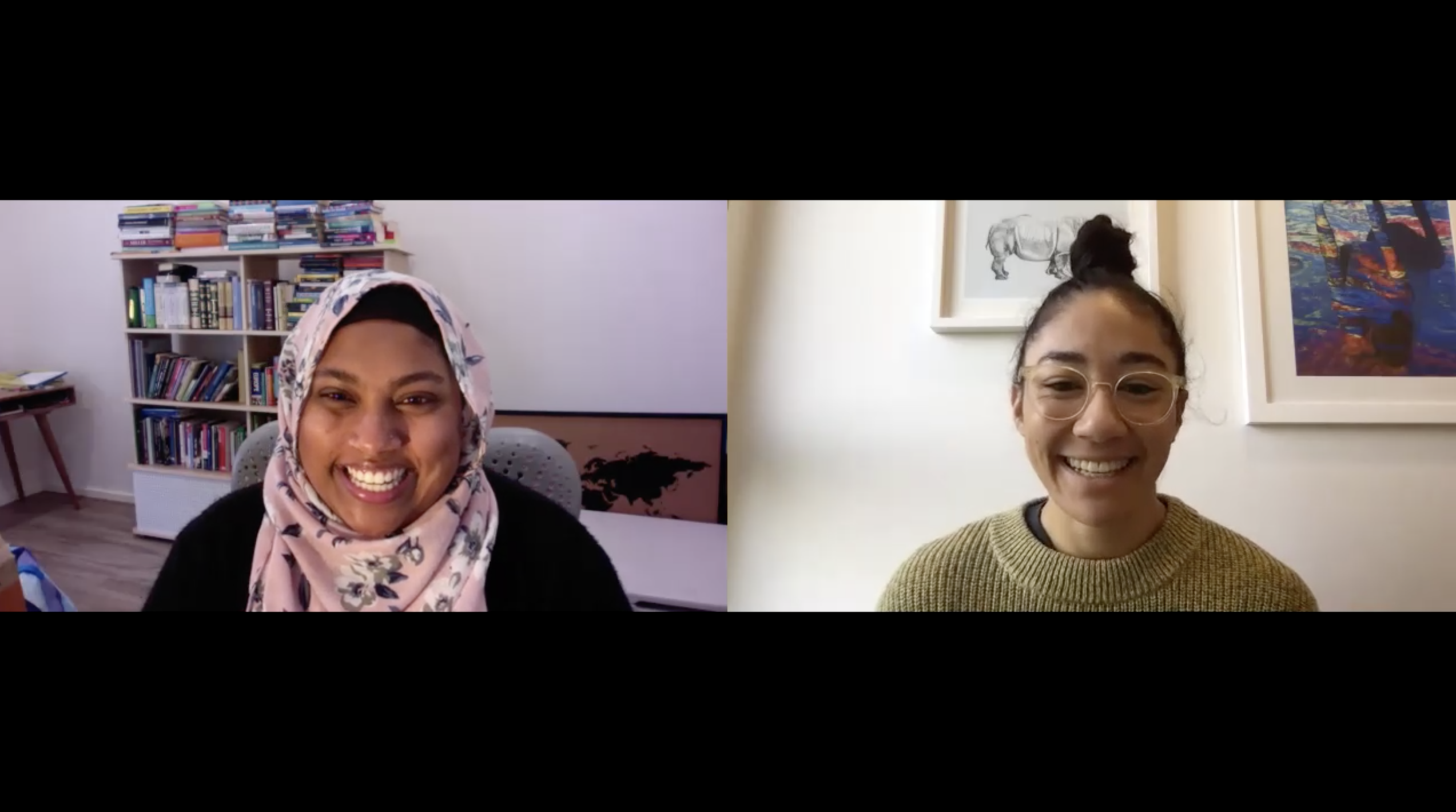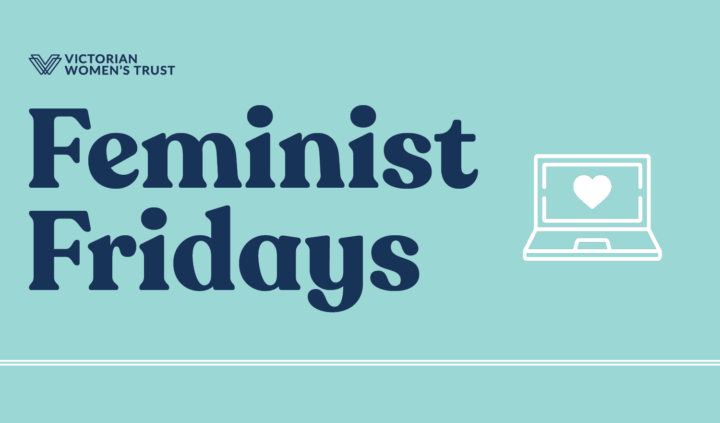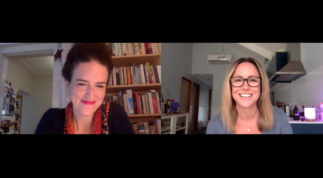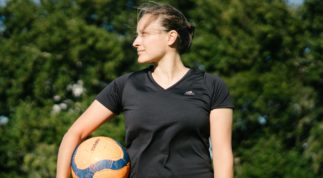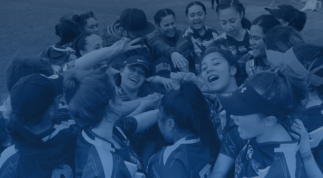The second edition of Feminist Fridays, presented by the Victorian Women’s Trust, went live on Friday 15 May.
Featuring Darcy Vesvio (star AFLW player for Carlton); and Rana Hussain (diversity & inclusion expert, podcaster from the Outer Sanctum podcast and VWT Board member) this instalment was about two important ‘f’ words: feminism and footy.
Feminist Fridays is fortnightly live stream series, featuring two feminists talking about the issues that matter. Each chat is broadcast live on the Trust Facebook page. Next edition: Friday 29 May 2020, 12pm AEST, speakers soon to be announced.
Catch up on their conversation now, and read the full transcript below:
Transcript:
Rana Hussain: Hello and welcome everyone to Feminist Fridays. I want to start by acknowledging the country on which we have this conversation today and continue to connect, even virtually. I acknowledge the Wurundjeri people of the Kulin nation and pay my respect to their Elders past, present and emerging.
Welcome everyone this is Feminist Fridays, it’s a fortnightly series of live conversations between feminists on the issues that matter. Short, sharp and to the point, watch over lunch or catch up later. And to make sure you don’t miss a thing, follow the Victorian Women’s Trust and RSVP to all the upcoming Feminist Friday events. And to those of you on Twitter, remember to use the hashtag #FeministFridays.
I am Rana Hussain, broadcaster and diversity and inclusion enthusiast. And mother of a five-year-old who is currently homeschooling. So fingers crossed we don’t get a little cameo from her! Which tends to happen when I’m working from home.
With me today is Darcy Vescio, beloved AFL star and player for Carlton Football Club. Welcome Darcy!
Darcy Vescio: Thanks for having me, so good to chat to you Rana.
Rana Hussain: So nice to be chatting with you today. I’m really excited to be doing this, I have missed footy so much, so this is going to be awesome.
I want to start by taking you back to 2017, that first AFLW game. We all remember…oh and there’s my doorbell, if anyone’s listening to that!
So many of us remember that feeling that was around that first game and Ikon park. There was just a sense of excitement and a feeling that a new era was being heralded. Not just for women’s sport but even for gender equality in general. I’m interested in what it was like for you as a player? Can you take us into what that moment was like?
Darcy Vescio: Yeah, I love sort of thinking back to that week and that time period. So, at the time I was working at the club as a graphic designer, so I had a really unique perspective leading into the game. Because I was seeing what was going on in the background and the way the club was preparing. And of course the game was initially going to be played at Olympic Park, which had a capacity of 5000 and then it got moved pretty much a week out. So the club was sort of scrambling, and really excited. So I got to see that side of it.
But I remember, I think all of us entered the game so excited but also so unsure about what was about to happen. You know, I think we all had hopes and dreams of what it would be like. And I guess we were all managing our own expectations. I remember the club thinking that if we got 12,000 people to show up, that would be a huge success. And I think that’s the number that they catered for in terms of food and drink and that sort of thing.
I remember the night really well. I guess it’s been well documented as well. But I just remember feeling so, so, so, so happy. And almost just the feeling of euphoria after the game that everything had happened and the amount of people that showed up, I couldn’t believe it. And it pretty much just shattered my expectations of what was possible at the time. And just opened my eyes up to this new world, and I think a lot of people realised in that moment that we’d been missing something that we all wanted for a long time.
It’s a pretty amazing thing to be part of. I love reliving it and rethinking about it I guess.
Rana Hussain: Was it a moment for gender equality for you and the other players, or was it about the football?
Darcy Vescio: I think it was both. I think, looking back and hearing stories of people who came on the day or on the night, there were so many different people. So there were traditional footy fans, there were people who had watched women’s footy for a long time and wanted to see what the next level was, but there were also people who had never ever engaged in football before and who were just there to support the women. They didn’t care about who was playing, they were just there to be another person there and to say I’m here to watch you and you have my full attention, sort of thing.
I’m sure some people came into it knowing that this was going to be a huge moment in history. But I think a lot of people just came on instinct as well and just wanted to be there.
Rana Hussain: What would adolescent Darcy have thought of that moment?
Darcy Vescio: I really have no idea. Growing up, I was a mad football fan and loved playing football with my brothers.
I grew up in a small country town outside of Wangaratta. So football was always a really big part of my life. But I hung up the boots at 14, because I couldn’t play anymore. So there was no way I ever thought that I’d be able to do what I’m doing today. And it’s sort of almost, snuck up quickly.
I started playing footy again when I started University and moved to Melbourne. And it was sort of just at a hobby level, and then things just escalated really quickly.
Yeah I think, looking back I couldn’t have imagined it. But I would have been so excited, if I knew this was coming, it could have changed a lot.
Rana Hussain: We know that women’s football looks different on field to the men’s game. But as a whole, what are some of the differences between the two? And what are some of the important qualities that AFLW embodies?
Darcy Vescio: Really good question. I think one of the main things is just the way AFLW has evolved, only a few decades ago, not even, football was a space that was mainly for and driven by the LGBTIQ+ community. So you know the origins of women football come from these rebel women in society who didn’t care about what other people thought of them playing football. They were ridiculed, it really wasn’t that long ago, that the articles in the paper would be terrible, saying that they shouldn’t be playing football. I guess it’s not too dissimilar to what we can read these days even. But it was more of an accepted view.
So yeah these people just created ths space where they could be themselves and where they didn’t have to worry about what people thought of them and it was a really safe space I guess, for people who didn’t necessarily fit the box.
So I think it’s really important to continually acknowledge that. Because without the contributions of all these people who probably felt turned away from football, they’ve really driven this space.
And it’s evolved over time, and more people from all different backgrounds have become part of it, but I think it was initially that queer community who started it all and who drove it. So I guess that’s a really big change all of a sudden, the AFL saw a big surge in people from all different backgrounds joining that sort of AFL community as well. And being recognised at an AFL level. So that’s probably the biggest sort of difference I think.
Rana Hussain: And do you think that kind of core of inclusivity has been maintained over the last 4 years, since that initial game?
Darcy Vescio: I think so. I think the majority of girls playing in the AFL have come from their local leagues and have been part of the women’s footy system for quite some time. So I think most of the women playing would understand the roots of women’s football.
And I think also we’ve had Pride games over the past three seasons, so that allows the girls to reflect on that and also share that story with people who are new to AFLW, and even new to playing in the teams, and cross coders and that sort of thing.
But yeah, I think it’s a really important part of women’s football. And it makes you really proud to be part of that space.
Rana Hussain: It seems to me like this is one of the ways in which women’s sport, not just footy, but women’s sport in general can really lead. Is that how you feel about the AFLW?
Darcy Vescio: Yeah, I think so. Even, I guess the team I played for before joining Carlton was the Darebin Falcons, it’s an entire sporting club built by women for women and it’s an amazing place. I think entering that club, that was the first time I had ever seen women leading from every angle and doing every job and just seeing how you just get stuff done, sort of thing.
Yeah, I feel like that sort of spirit is still in AFLW and throughout those clubs because those people have come from those environments. So I feel like there’s a lot to learn. Automatically clubs that have an AFLW team, I think they’ve felt that shift in dynamic and how things can be done differently.
Rana Hussain: I’m interested in whether you’ve followed women’s sports movements globally. So for example women’s soccer in America and everything that’s happening with them at the moment and them fighting for equal pay. Do you follow that stuff?
Darcy Vescio: Probably not as closely as I should, I think. I was listening about it the other day and getting some updates on what was happening. But yeah, it’s certainly a fight that we’re all fighting; whether it’s the US soccer team or someone at work trying to get what they’re worth, sort of thing. You know, it’s disappointing that you continually have to say the same thing and fight the same fight. But at the same time things are definitely progressing but just really slowly and I think the more that everyone rallies together, and if you’re able to link things as well, I think it makes you feel like you’re part of a bigger brigade. You sort of feel like you’re part of that bigger picture, which I think is really important. Sometimes you can feel like you’re fighting it on your own, but I think if you can stay connected to what’s happening globally you realise that you’re actually all surging together.
Rana Hussain: We all kind of know the power of sport to push those conversations around gender equality forward. I’m interested in what effect, thinking about the situation we’re in currently, what effect COVID-19 is having on the AFLW? Not just clubs but the community in general.
Darcy Vescio: Yeah I guess it’s really hard to sort of understand it right now because you’re still in it. I’m sure in years to come we’ll be able to look back and sort of write a succinct piece on the effects of COVID-19.
But I think just being stripped of football, like I know I definitely felt that way. You know we finished our first final, we were on our way into a pre-lim we were so pumped and then not even an hour and a half later it was like we’re done sort of thing, the announcement came through. I think yeah, people just being stripped of something that they’ve always sort of had, and you almost take it for granted that you were able to just play week in week out, you know. The saying ‘there’s always next week’ sort of thing just gets taken away.
But yeah, I really feel for the kids out there too who don’t have their footy team to go to or whatever sport it is because I think you get so much out of coming together, you know. It’s not just kicking a ball around it’s being able to connect with other people and learn life skills and everything like that. So I think there’s a big sherrin shaped hole in a lot of people’s lives at the moment, but yeah I guess we’re yet to know what the full effect is.
Rana Hussain: Yeah, I totally agree. I think that is what footy is. I mean certainly in my life footy has given me a sense of belonging, a community, something to do every weekend and catch up with people and feel safe in a space and enjoy the entertainment of sport. Having that taken away has really been difficult. You know I do feel for the people who, women’s football in particular, was their safe space and is their place where they feel that they belong. Fingers crossed that it comes back really quickly, because I need it, I need it back.
I’m just interested in what the future looks like. I mean obviously we really can’t know, but what does a rebuilt post COVID look like for AFLW do you think?
Darcy Vescio: Yeah, I have sort of thought about it a little bit but then I’m worried to think about it sometimes too. I really don’t know, we don’t really have any indication of when we’ll be able to come back into the club, I think. Obviously at the moment getting the boys back in, because they’re technically in their season, so that’s the priority which is definitely understandable.
I don’t really know what, I guess, how our program will evolve and change in order to be sustainable going forward. You know, I’m confident that AFLW is not going anywhere. I’m absolutely confident that, you know, it’s part of football now and I know it brings so much to so many people, so it can’t go anywhere.
I think one of the big things about the people within women’s football, and because we are quite new as well, is that we are quite nimble and we are really resourceful. I think our programs at the moment aren’t full of money, we sort of do a lot with a little. And it’s getting better, it’s definitely getting better every year but I think if anything we’re probably well equipped to deal with a big big set back like this.
I think, you know, we’ve always been able to lean on each other and find ways through things so I’m confident that whatever happens we’ll be able to find a way to make it work. But yeah, it might not be easy, but we’ll find a way.
Rana Hussain: It’s almost like, like we were talking about, inclusivity is the core of women’s football but the other core if you will is resilience. It has survived despite so many barriers and thrives and it almost has what it takes more than anything else to continue in that way. Is there something that you want our listeners, people who have tuned in today, to know about women’s sport and moving forward how they can help make sure that AFLW is here to stay?
Darcy Vescio: It’s a big question. I think probably just showing your support and speaking about AFLW. Yeah, I think the more people can see and hear how much it means to people, it really does make a big difference.
I think, you know, we’re four seasons in and it does feel a lot more normal than it did at the start, but not that much has changed lifestyle wise for a lot of the girls. I think, it’s not like, you know, most of the girls are not earning very much to play at all. I think people can forget that. You can sort of feel like ‘oh yeah like AFLW it’s a thing, it’s been around for a while now’; but really the conditions aren’t that different to when the girls initially started. So I think just hearing that support means a lot. Yeah, all the little things do go a long way.
Rana Hussain: And demand, just demand of your broadcasters, your footy clubs, that women’s footy clubs are front and center. I think it’s on us as consumers to turn up as well. That’s how I look at it anyway.
I guess this is the end of our short and sharp conversation, that’s our time up. It’s flown, I could talk to you all day about this stuff. But I will wrap up by saying to all of you out there listening, make sure you tune into the next Feminist Friday which is in a fortnight on May 29th. You can follow the Victorian Women’s Trust to get the latest guest announcements and I am confident that they will be just as exciting as today’s guest.
Feminst Fridays is of course brought to you by the Victorian Women’s Trust and if you’d like to support these events and their amazing work toward gender equality you can donate at www.vwt.org.au/donate. I know it’s a tough time for everybody, but if you have the ability to donate I highly recommend.
Thank you so much Darcy for having this chat with me today, like I said I could pick your brain on this forever, and thank you to everybody for tuning in. So lovely to see you.
Darcy Vescio: Thanks so much Rana, that was fun and yeah thanks everyone who’s listening.
Rana Hussain: See you later, have a great Friday everybody!
The next Feminist Fridays will be broadcast at 12pm AEST on Friday 29 May 2020 on the Trust Facebook page.
